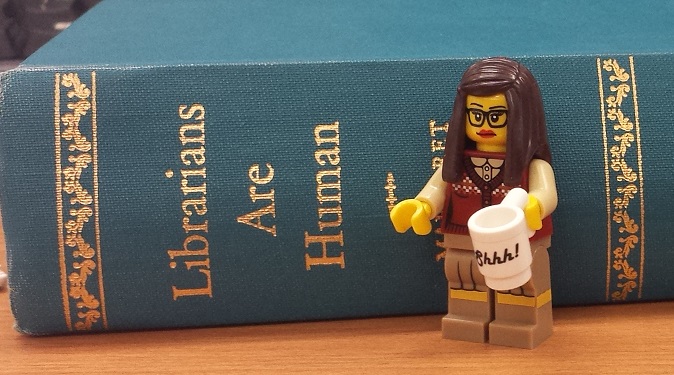History Society trip to Prague and Vienna, 2018
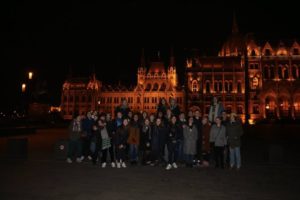
As one of the Trip Officers for the Edinburgh University History Society, Student Ambassador Carmen was responsible for organising a trip to Budapest and Vienna for 40 society members during Innovative Learning Week.
While we were only away for 5 days, it felt like ages because we did so much in both cities! – Carmen
Day 1: Monday, 19th of February
Our flight to Budapest was extremely early – but this meant we got there really early too, giving us plenty of time to get our bearings! While the sky was blue, it was freezing cold as we walked around streets on the Pest side of the city, taking in the amazing views of Liberty Square & Parliament Square.
After giving everyone a few hours to have dinner (and a nap after a long day of travelling!), we met up again to see the iconic Hungarian Parliament building light up at night. Here, we were able to get a big group photo, before running off to take some night shots of the stunning view over the River Danube!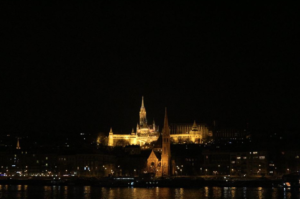
Day 2: Tuesday, 20th of February
On our second day, we walked along the Széchenyi Chain Bridge (covered in snow!) to go across the Danube to Buda Castle. Using our trusty Budapest Cards, we were able to get a free Castle bus that took us outside the building – a lifesaver considering it was a very uphill walk!
Some of our group were lucky enough to see the changing of the guard at the Sándor Palace, the residence of the Hungarian President. Others visited The Budapest History Museum and The Hungarian National Gallery. I particularly enjoyed the third and final floor of the Hungarian National Gallery, as it had some really interesting Hungarian modern art.
Later that afternoon, we had a private tour of Hospital in the Rock. This is a museum located in an underground cave system near Buda Castle, which was previously used as a hospital during World War II and The Hungarian Revolution of 1956. During the Cold War, it was also used as a nuclear shelter and remained a top-secret operation until 2002. We were not permitted to take any photos during this museum tour, but everyone loved the tour. During our visit, there were items on loan from museums in Hiroshima and Nagasaki, giving us the chance to see objects that were destroyed during the blast in 1945.
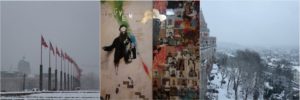
Afterwards, some members of the History Society committee and myself (with a giftshop bag from Hospital in the Rock in hand) went to visit Fisherman’s Bastion, a beautiful terrace giving us some panoramic views of the city.
Day 3: Wednesday, 21st of February
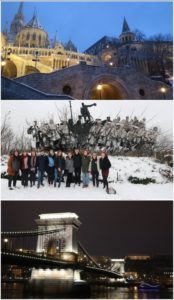
Early on Wednesday morning, I took a large group of people on the trip to Memento Park (also known as Memorial Park). Located on the outskirts of Budapest, this open-air museum houses over 40 statues that would been placed throughout towns and cities in Hungary during the Communist era.
Later that afternoon, we went to House of Terror, a museum dedicated to the fascist and communist regimes in Hungary during the 20th century. We were also not allowed to take photographs in this museum, but it was fascinating being able to see how Hungary exhibits its horrific past. Afterwards we went to Lukacs Thermal Baths. This is one fo the local baths in the city and allowed us to relax before getting ready to pack our things and leave for Vienna the next day.
Day 4: Thursday, 22nd of February
Early in the afternoon, we set out from Budapest via private coach and made our way to Vienna! Here, we checked into our hostel and had a wander around the city before eating at the Naschmarkt, home to many fantastic restaurants. That night, I was so tired after a long day of travelling and sightseeing I went straight to bed! However, some very dedicated tourists in our group went to the prestigious Vienna State Opera.
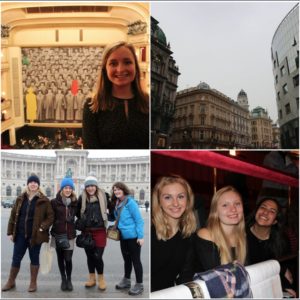
Day 5: Friday, the 23rd of February
On our last full day of our trip, we got up early to go and visit the Hofburg Palace. This was the former imperial palace and winter residence of the Habsburg Dynasty, who previously ruled the Holy Roman Empire. The building was built in the 13th century and today serves as the residence and the workplace for the President of Austria.
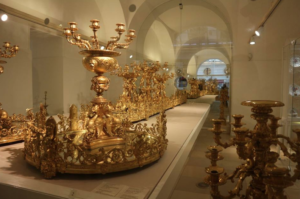
The Palace has many interesting exhibitions. We got to see The Imperial Silver Collection, which was fascinating because it showed how complex and ornate having dinner was for the Habsburg family; we got to find out about the life of Empress Elisabeth of Austria, commonly known as Sisi, who had struggled with the fame and social expectations of royalty before being assassinated; and we got to see The Imperial Apartments, which gave us a glimpse of how the Austrian royal family really lived. We were not allowed to take photos in most of these exhibitions, but I definitely took a lot from this visit and learned so much about Austrian history that I did not know about before!
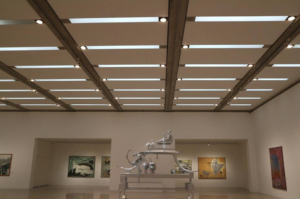
Afterwards, we all went to lunch and then reconvened later in the afternoon to go to the Imperial Crypts. This is the burial vault of the Habsburg Dynasty, where the bones of 145 royals are kept, and it is astonishing to see how extravagant their coffins are! Here, we also saw Sisi’s coffin, as well as that of her husband, Franz Joseph.
For the rest of the day, everyone had free time to get as much sightseeing as possible of Vienna! I went to Mumok, a world-renowned modern art museum located in the famous MuseumsQuartier. It was really great fun, especially the interactive exhibition when we were allowed to wear aluminium foil jackets!
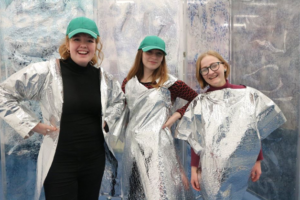
Later that evening, we had our final dinner of the trip as one big group in an authentic Austrian tavern. This gave us time to reflect on our busy and fun-filled week that we’d had, as well as the opportunity to eat some pork schnitzel and kaiserschmarrn, a fluffy shredded pancake traditionally served with plum jam.
Day 6: Saturday, 24th of February
Home time!
I thoroughly enjoyed being responsible for organising an international trip with the Edinburgh University History Society. While certainly stressful at times, I learned a lot about myself and played a key role as part of a team; developed so many new skills that I would not have been able to otherwise; and made long lasting friendships along the way. I believe that societies truly enhance student life here at Edinburgh, and I am so glad that I made the decision to become involved in the student community in this way. Hopefully I’ll get a place on the very popular History Society trip next year, as they are such a fantastic way to go abroad with new people at an affordable price!
Disclaimer
University of Edinburgh Student Ambassadors are financially compensated to tell their stories.


